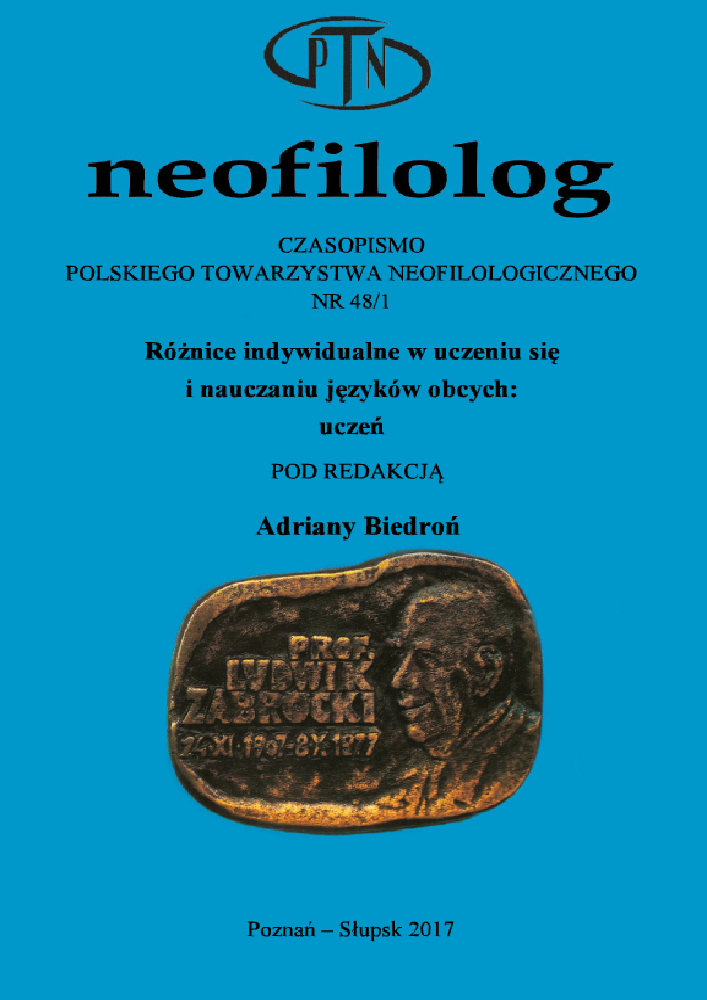Abstract
The article reflects on individual differences of foreign language users from the standpoint of polylingual communication in two related languages (intercommunication), on the basis of the work of Paolo Balboni on intercomprehension, intercommunication and useful approaches to foreign language learning. The author attempts to elaborate a list of individual characteristics which facilitate intercommunication (a conversation in which the participants speak different, but related languages). The discussion relates to features presented by selected authors in the field of foreign language teaching, the European documents on language education (CEFR and FREPA) and to psycholinguistics. The final part describes the characteristics which favour intercommunication.References
Balboni, P. 2010. „Esiste un’attitudine all’intercomunicazione?”. (w) Lernerautonomie durch Interkomprehension. Promoting Learner Autonomy Through Intercomprehension. L’autonomisation de l’apprenant par l’intercompréhension. (red. P. Doyé i F. J. Meissner). Tübingen: Narr Francke Attempto Verlag, str. 17-28.
Balboni, P. 2012. Le sfide di Babele. Insegnare le lingue nelle società complesse. Novara: De Agostini Scuola SpA.
Candelier, M., Camilleri-Grima, A., Castellotti, V., de Pietro, J.-F., Lőrincz, I., Meissner, F.-J., Noguerol, A. i A. Schröder-Sura (Conseil de l’Europe). 2012. Le CARAP. Un Cadre de Référence pour les Approches Plurielles des Langues et des Cultures. Compétences et ressources. Strasbourg: Editions du Conseil de l’Europe. http://www.ecml.at/Resources/ECMLPublications/tabid/277/PublicationID/82/l anguage/fr-FR/Default.aspx DW 04.05.2015.
Candelier, M. i A. Schröder-Sura. 2012. „Wspieranie rozwoju kompetencji różnojęzycznych i międzykulturowych w klasie szkolnej”. Języki Obce w Szkole, 4/2012: 4-11. http://www.jows.pl/node/322 DW 01.07.2016.
Costa, P. T., Jr. i R. R. McCrae. 1992. Revised NEO Personality Inventory (NEO-PI-R) and NEO Five-Factor Inventory (Neo-FFI) professional manual. Odessa, FL: Psychological Assessment Resources.
Coste, D., North, B., Sheils, J. i J. Trim (Rada Europy). 2003. Europejski system opisu kształcenia językowego: uczenie się, nauczanie, ocenianie.Warszawa: Wydawnictwa CODN.
Degache, C. 2008: „Concevoir un dispositif de formation en ligne de formateurs à la compréhension et à l’interaction plurilingues”. (w) S'entendre entre langues voisines: vers l'intercompréhension. (red. V. Conti i F. Grin). Genève: Georg, str. 293-316.
Délégation générale à la langue française et aux langues de France (DGLFLF). 2007. L'intercompréhension entre langues apparentées. Références 2006. Paris. http://www.culture.gouv.fr/culture/dglf/publications/References07_Intercomprehension.pdf DW 06.03.2015.
Dörnyei, Z. 2001. Motivational strategies in the language classroom. Cambridge: Cambridge University Press.
Dörnyei, Z. 2005. The psychology of the language learner: individual differences in second language acquisition. Mahwah, New Jersey: Lawrence Erlbaum.
Dörnyei, Z. i M. L. Scott. 1997. „Communication strategies in a second language: definitions and taxonomies”. Language Learning, 47: 173-210.
Dörnyei, Z. i S. Ryan. 2015. The psychology of the language learner revisited. New York: Routledge.
Eco, U. 1993. La ricerca della lingua perfetta nella cultura europea. Bari: Editori Laterza.
Escudé, P. i P. Janin. 2010. Le point sur l’intercompréhension, clé du plurilinguisme. Paris: Clé International.
Grabowska, A. 2013: „Interkomprehensja w językach pokrewnych – jej założenia i możliwości adaptacji w nauczaniu języków obcych w Polsce”. (w) Problemy współczesnej neofilologii. Wybrane zagadnienia. (red. A. Grabowska, J. Graca i L. Smutek). Tarnów: Wydawnictwa Państwowej Wyższej Szkoły Zawodowej w Tarnowie, str. 281-291.
Grabowska, A. 2015: „Interkomprehensja w językach pokrewnych a nauczanie języków obcych na potrzeby rynku pracy”. (w) Nauczanie języków obcych na potrzeby rynku pracy. (red. M. Sowa, M. Mocarz-Kleindienst i U. Czyżewska). Lublin: Wydawnictwo Katolickiego Uniwersytetu Lubelskiego Jana Pawła II, str. 328-339.
Komorowska, H. 2002.Metodyka nauczania języków obcych. Warszawa: Fraszka Edukacyjna.
Lesiak-Bielawska, E. D. 2013. Różnice indywidualne w procesie akwizycji języka. Psychologiczne uwarunkowania dydaktyki języków obcych. Warszawa: Oficyna Wydawnicza Łośgraf.
Pawlak, M. 2013: „Różnice indywidualne a rozwijanie kompetencji językowych”. (w) Dydaktyka językowa a kompetencje ogólne. (red. J. Stańczyk i E. Nowikiewicz). Bydgoszcz: Nauczycielskie Kolegium Języków Obcych w Bydgoszczy, str. 99-120.
Pervin, L. A. 2002. Psychologia osobowości. Przekład M. Orski. Gdańsk: Gdańskie Wydawnictwo Psychologiczne.
Selinker, L. 1972. „Interlanguage”. International Review of Applied Linguistics, 10: 209-241.
Skehan, P. 1989. Individual differences in second language learning. London: Edward Arnold.
Skehan, P. 1998. A cognitive approach to language learning.Oxford: Oxford University Press.
Smuk, M. 2016. Od cech osobowości do kompetencji savoir-ȇtre – rozwijanie samoświadomości w nauce języków obcych. Lublin ̶ Warszawa: Wydawnictwo Werset.
Strelau, J. (red.). 2000. Psychologia. Podręcznik akademicki. Tom 2 – Psychologia ogólna. Gdańsk: Gdańskie Wydawnictwo Psychologiczne.
Strelau, J. 2015. Różnice indywidualne. Historia – determinanty – zastosowania. Warszawa: Wydawnictwo Naukowe Scholar.
Wilczyńska, W. (red.). 2002. Autonomizacja w dydaktyce języków obcych. Doskonalenie się w komunikacji ustnej. Poznań: Wydawnictwo Naukowe UAM.
Wilczyńska, W. 2005. Introduction à la didactique du français langue étrangère. Wstęp do dydaktyki języka francuskiego jako obcego. Kraków: Wydawnictwo Flair.
License
Copyright (c) 2017 Anna Grabowska

This work is licensed under a Creative Commons Attribution-NoDerivatives 4.0 International License.
Authors
Authors of texts accepted for publication in Neofilolog are required to complete, sign and return to the Editorial team’s office the Agreement for granting a royalty-free license to works with a commitment to grant a CC sub-license.
Under the agreement, the authors of the texts published in Neofilolog grant Adam Mickiewicz University in Poznań a non-exclusive, royalty-free license and authorize the use of Attribution-NoDerivatives 4.0 International (CC BY-ND 4.0) Creative Commons sub-license.
The authors retain the right to the free disposal of the work.
Users
Interested Internet users are entitled to use works that have been published in Neofilolog since 2017, under the following conditions:
▪ attribution – obligation to provide, together with the distributed work, information about the authorship, title, source (link to the original work, DOI) and the license itself.
▪ no derivatives – the work must be preserved in its original form. Without the author's consent, it is not possible to distribute the modified work in the form of translations, publications, etc.
Copyrights are reserved for all texts published since 2017.
Miscellaneous
Adam Mickiewicz University in Poznań retains the property right as a whole (layout, graphic form, title, cover design, logo etc.).
